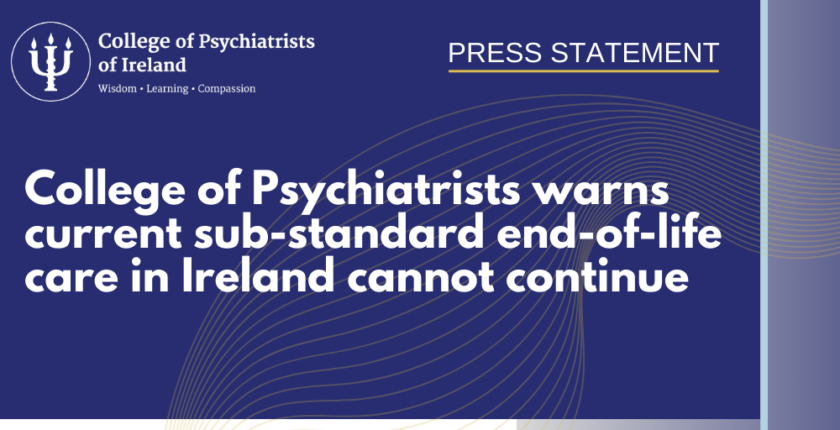Blog
Press Statement: College warns current sub-standard end-of-life care in Ireland cannot continue
- November 14, 2023
- Posted by: Ian Rice
- Category: Blog College in the media EAP Activities External Affairs & Policy Government Policy Media Of interest from media Press Statements

The below press statement was issued to the media on Tuesday, 14 November ahead of the Oireachtas Joint Committee on Assisted Dying. You read it in full below or via PDF here. Read the full College opening statement to the Oireachtas committee via PDF here.
The College is against the introduction of assisted dying here
The College of Psychiatrists of Ireland has today (Tuesday) warned the Oireachtas Joint Committee on Assisted Dying that the unequal distribution of palliative care services, a dearth of psychological and psychiatric supports available to people with challenging health journeys, and insufficient research in end-of-life care in Ireland cannot continue.
It said: “The answer to this is not to end our patients’ lives, but rather is to interrogate each and every incident of concern, to clarify relevant contributing factors, and to provide the appropriate evidence-based interventions ranging from improved pain control to family support.”
Speaking to the Committee, the College of Psychiatrists outlined four main points:
- The current status quo, where we know that an important minority of patients are not receiving the optimal level of specialist palliative care and psychosocial support to allow them to die with dignity, cannot continue.
- As psychiatrists, we believe it is not possible to clearly differentiate between suicidal patients and patients who request assisted dying. There is potential for assisted dying to undermine the fundamental principles that suicide is preventable, and interventions that are proven effective in suicide prevention should take precedence across our health system.
- We emphasise the impossibility of separating physical and mental disorders. Our longstanding splitting of illness into ‘real, medically and socially validated’ physical conditions such as cancer or diabetes, and ‘poor moral fibre, pull your socks up’ mental health disorders has persisted despite our advancing neuroscientific knowledge.
- Autonomy and decisional capacity, and the cornerstone of any decision being ‘voluntary and well considered’ are highly complex for people who, for example, are autistic or have intellectual disability and can be difficult to assess.
Speaking today, Professor Siobhan MacHale, Consultant Liaison Psychiatrist, said: “One of the reasons that the potential introduction of assisted dying in Ireland is so concerning is that we are already operating in an environment of sub-standard end-of-life care. It stands to reason that this status quo cannot continue and that we must at the very least offer patients optimal levels of care at this critically important stage of their lives before this legislation is even considered.”
Dr Eric Kelleher, Consultant Liaison Psychiatrist and a member of the College’s Human Rights and Ethics Committee, added: “With regard to the question of whether one person’s choice of assisted dying will have an impact on another who does not so choose, we would say: the introduction of assisted dying legislation means that every person has to then choose it as a potential option or not for their end-of-life care. No person is an island.”
The College added that more research and input from patients and their families was needed to reflect the complexity of this proposed legislation.
